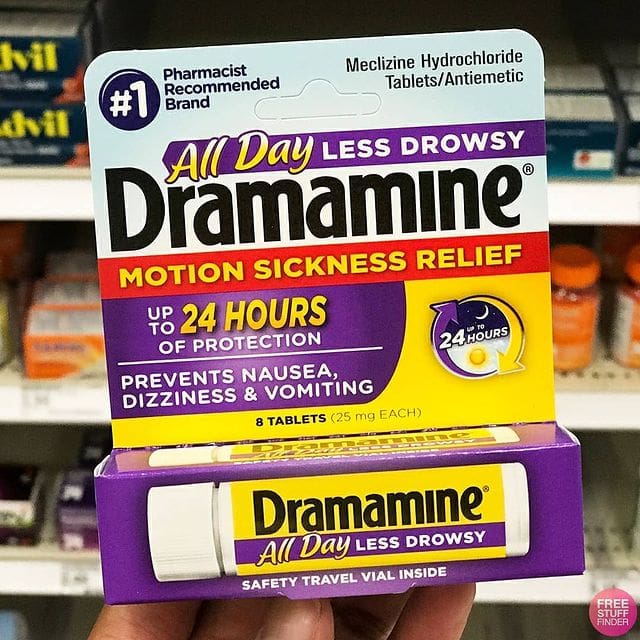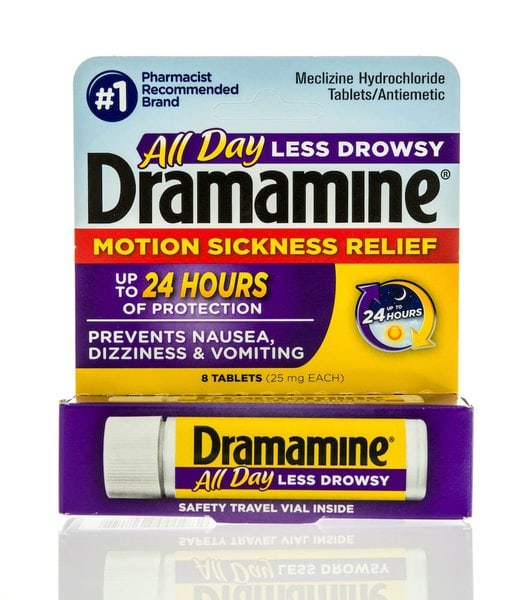In addition to being excellent companions, dogs also make great travel buddies. But, similar to humans, pooches are also prone to suffering from motion sickness. And as Dramamine is quite effective at countering motion sickness in humans, it is only right to wonder if this drug is safe for canine use.
So, is it safe for dogs to take Dramamine? Dogs can take Dramamine because it is safe for use in countering canine nausea and motion sickness. But this drug should only be administered to pooches after consulting a vet to get an appropriate prescription.
If your canine companion constantly suffers from motion sickness after going on car trips, the knowledge that you can treat such a pooch’s symptoms with Dramamine should come as a relief. However, before you go ahead and administer this drug to your canine buddy, you should be aware of the recommended dosage and possible side effects, all of which are duly covered in this article.
Can Dogs Take Dramamine?

Dogs can take Dramamine, but this drug should be administered to pooches only with a vet’s prescription.
Dramamine, or Dimenhydrinate, its generic name, is an over-the-counter antihistamine that is typically used to treat and counter the effects of motion sickness in dogs.
Dimenhydrinate, which is the active ingredient in Dramamine, is the weaker version of diphenhydramine, common for its use in formulating the popular Benadryl.
That said, Dramamine hasn’t yet been approved for canine use by the Food and Drug Administration (FDA), but vets typically prescribe it for use in dogs as an extra-label drug.
What Type Of Dramamine Can I Give My Dog?
There are several forms of Dramamine available in the market, with the most common products being:
- The original Dramamine product
- Dramamine for kids’ formula
- Chewable tablets containing Dimenhydrinate, and
- The ‘All Day Less Drowsy’ formula that contains meclizine
All of the aforementioned Dramamine products are safe for dog use.
How Much Dramamine Should I Give To My Dog?
As earlier stated, Dramamine has not been approved for use in dogs by the FDA, which is why getting a vet’s prescription is recommended if you’re to treat your canine buddy with this drug.
Generally speaking, most vets will prescribe 2 mg of Dramamine per pound of the pooch’s body weight. And in most cases, this drug isn’t to be given to the pooch more than three times daily.
What the above simply means is that, if you have a pooch that weighs 15 lbs, you can give Fido 30 mg of Dramamine at 8-hour intervals.
If, however, you’re unsure of what your canine buddy weighs, and you have no means of immediately determining the Fido’s weight, then it is best that you underestimate the pooch’s weight as a way of guaranteeing the doggy’s safety.
On the other hand, Dramamine products containing meclizine are usually prescribed to be used once daily and at an amount not exceeding 25 mg to control nausea and vomiting.
What Is Dramamine Used For?

Dramamine is commonly used to treat the symptoms of motion sickness in dogs, and this antihistamine is also effective at dealing with canine nausea.
To Treat Motion Sickness In Dogs
As stated in the opening paragraphs of this article, dogs are prone to suffering from motion sickness after traveling in a car, even when the trip is relatively short. And Dramamine is generally used to counter the symptoms of motion sickness in pooches.
Motion sickness in dogs mostly develops when a pooch is overwhelmed by the various stimuli, such as strange smells, unknown sounds, and unfamiliar sights, it is exposed to while in a moving vehicle. And this typically results in anxiety and stress that manifest with various symptoms.
That said, symptoms of motion sickness in dogs vary from pooch to pooch, but the most common examples include:
- Drooling
- Vomiting
- Excessive lip licking
- Panting
- Rapid breathing
- Excessive yawning
- Reluctance to enter a vehicle, most especially cars
- Whining
- Tightening of facial muscles
How Does Dramamine Counter Motion Sickness?
Dramamine works to prevent motion sickness by inhibiting stimulation of the brain’s vestibular system; This is done by preventing the passage of information from a pooch’s middle and inner ear to the part of the brain responsible for coordinating reflex actions.
And this action, in turn, prevents the dog from exhibiting reflexive symptoms such as vomiting and swallowing.
Can Dramamine Be Bad For Dogs?
Dramamine use in dogs typically comes with certain side effects, and this drug may also react with certain medications to wreak havoc within a pooch’s body system.
Side Effects
Dramamine, typical with most other Antihistamines, is known to induce side effects in pooches. And as a dog owner, knowledge of the side effects typically caused by Dramamine use in dogs is crucial in making preparations to counter these side effects.
That said, some of the side effects of Dramamine use in dogs include:
- Dryness of the mouth
- Lethargy and weakness
- Urine retention
Dramamine can also induce side effects such as diarrhea, vomiting, and weight loss, but these are quite rarely observed in dogs.
It is, however, worth noting that these side effects of Dramamine on dogs will become less frequent with repeated use of this drug.

Interaction With Other Drugs
Apart from inducing side effects, Dimenhydrinate, which is the active ingredient in Dramamine, may also react with compounds found in certain medications to trigger additional side effects in pooches.
That said, some of the drugs with which Dramamine may interact, to devastating effect, include:
- Heparin
- Sedatives
- Central nervous system depressants
- Tranquilizers
- Warfarin
Additionally, Dramamine can also reduce the effectiveness of anticoagulants and epinephrine.
Consequently, if your canine buddy is already using any of the medications mentioned above, it will be prudent of you to consult your vet to prescribe a safer alternative to deal with your Fido’s motion sickness.
Dogs With Existing Medical Conditions
In the same vein, Dramamine can be extremely bad for dogs that are suffering from certain pre-existing medical conditions, worsening and further complicating the symptoms of such health conditions.
If your canine buddy is suffering from any of the health challenges listed below, you should consult a vet before administering Dramamine to such a pooch.
- Liver diseases
- Lung diseases
- Heart diseases
- Hyperthyroidism
- Gastrointestinal obstruction
- Seizures
- Glaucoma
- Enlarged prostate
Additionally, Dramamine should be administered with caution on pregnant or nursing pooches, as this drug may adversely affect the puppies. And dogs with a history of allergic reactions to antihistamines should steer clear of using Dramamine.





